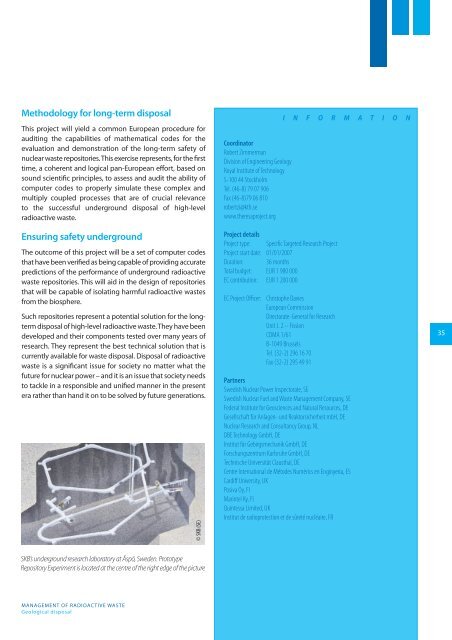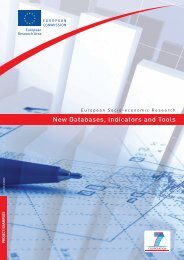Euratom FP6 Research Projects and Training Activities Volume III
Euratom FP6 Research Projects and Training Activities Volume III
Euratom FP6 Research Projects and Training Activities Volume III
You also want an ePaper? Increase the reach of your titles
YUMPU automatically turns print PDFs into web optimized ePapers that Google loves.
Methodology for long-term disposal<br />
This project will yield a common European procedure for<br />
auditing the capabilities of mathematical codes for the<br />
evaluation <strong>and</strong> demonstration of the long-term safety of<br />
nuclear waste repositories. This exercise represents, for the first<br />
time, a coherent <strong>and</strong> logical pan-European effort, based on<br />
sound scientific principles, to assess <strong>and</strong> audit the ability of<br />
computer codes to properly simulate these complex <strong>and</strong><br />
multiply coupled processes that are of crucial relevance<br />
to the successful underground disposal of high-level<br />
radioactive waste.<br />
Ensuring safety underground<br />
The outcome of this project will be a set of computer codes<br />
that have been verified as being capable of providing accurate<br />
predictions of the performance of underground radioactive<br />
waste repositories. This will aid in the design of repositories<br />
that will be capable of isolating harmful radioactive wastes<br />
from the biosphere.<br />
Such repositories represent a potential solution for the longterm<br />
disposal of high-level radioactive waste. They have been<br />
developed <strong>and</strong> their components tested over many years of<br />
research. They represent the best technical solution that is<br />
currently available for waste disposal. Disposal of radioactive<br />
waste is a significant issue for society no matter what the<br />
future for nuclear power – <strong>and</strong> it is an issue that society needs<br />
to tackle in a responsible <strong>and</strong> unified manner in the present<br />
era rather than h<strong>and</strong> it on to be solved by future generations.<br />
MANAGEMENT OF RADIOACTIVE WASTE<br />
Geological disposal<br />
© SKB (SE)<br />
SKB’s underground research laboratory at Äspö, Sweden. Prototype<br />
Repository Experiment is located at the centre of the right edge of the picture<br />
Coordinator<br />
Robert Zimmerman<br />
Division of Engineering Geology<br />
Royal Institute of Technology<br />
S-100 44 Stockholm<br />
Tel. (46-8) 79 07 906<br />
Fax (46-8)79 06 810<br />
robertzi@kth.se<br />
www.theresaproject.org<br />
Project details<br />
Project type: Specific Targeted <strong>Research</strong> Project<br />
Project start date: 01/01/2007<br />
Duration: 36 months<br />
Total budget: EUR 1 980 000<br />
EC contribution: EUR 1 200 000<br />
EC Project Officer: Christophe Davies<br />
European Commission<br />
Directorate-General for <strong>Research</strong><br />
Unit J. 2 – Fission<br />
CDMA 1/61<br />
B-1049 Brussels<br />
Tel. (32-2) 296 16 70<br />
Fax (32-2) 295 49 91<br />
I N F O R M A T I O N<br />
Partners<br />
Swedish Nuclear Power Inspectorate, SE<br />
Swedish Nuclear Fuel <strong>and</strong> Waste Management Company, SE<br />
Federal Institute for Geosciences <strong>and</strong> Natural Resources, DE<br />
Gesellschaft für Anlagen- und Reaktorsicherheit mbH, DE<br />
Nuclear <strong>Research</strong> <strong>and</strong> Consultancy Group, NL<br />
DBE Technology GmbH, DE<br />
Institut für Gebirgsmechanik GmbH, DE<br />
Forschungszentrum Karlsruhe GmbH, DE<br />
Technische Universität Clausthal, DE<br />
Centre International de Métodes Numèrics en Enginyeria, ES<br />
Cardiff University, UK<br />
Posiva Oy, FI<br />
Marintel Ky, FI<br />
Quintessa Limited, UK<br />
Institut de radioprotection et de sûreté nucléaire, FR<br />
35



